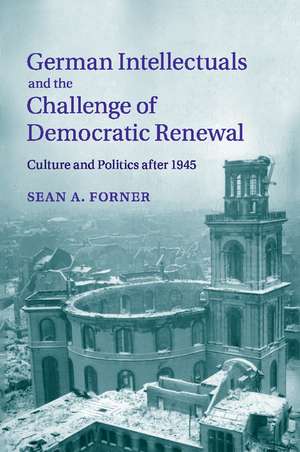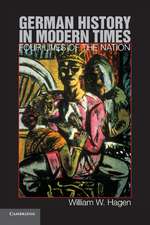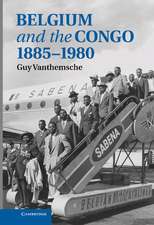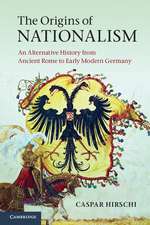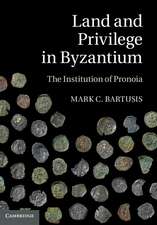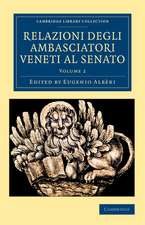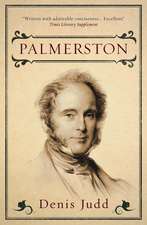German Intellectuals and the Challenge of Democratic Renewal: Culture and Politics after 1945
Autor Sean A. Forneren Limba Engleză Paperback – 22 mar 2017
| Toate formatele și edițiile | Preț | Express |
|---|---|---|
| Paperback (1) | 190.82 lei 3-5 săpt. | +28.35 lei 7-13 zile |
| Cambridge University Press – 22 mar 2017 | 190.82 lei 3-5 săpt. | +28.35 lei 7-13 zile |
| Hardback (1) | 760.82 lei 6-8 săpt. | |
| Cambridge University Press – 22 oct 2014 | 760.82 lei 6-8 săpt. |
Preț: 190.82 lei
Nou
Puncte Express: 286
Preț estimativ în valută:
36.51€ • 39.05$ • 30.44£
36.51€ • 39.05$ • 30.44£
Carte disponibilă
Livrare economică 27 martie-10 aprilie
Livrare express 13-19 martie pentru 38.34 lei
Preluare comenzi: 021 569.72.76
Specificații
ISBN-13: 9781107627833
ISBN-10: 1107627834
Pagini: 396
Ilustrații: 10 b/w illus. 1 map
Dimensiuni: 150 x 228 x 20 mm
Greutate: 0.53 kg
Editura: Cambridge University Press
Colecția Cambridge University Press
Locul publicării:New York, United States
ISBN-10: 1107627834
Pagini: 396
Ilustrații: 10 b/w illus. 1 map
Dimensiuni: 150 x 228 x 20 mm
Greutate: 0.53 kg
Editura: Cambridge University Press
Colecția Cambridge University Press
Locul publicării:New York, United States
Cuprins
Introduction: democratic renewal and Germany's 'zero hour'; 1. Germans, occupiers, and the democratization project; 2. Rethinking democracy: freedom, order, participation; 3. Renewing culture: the 'unpolitical German' between past and future; 4. Subjects of politics: publicness, parties, elites; 5. A parliament of spirit? Mobilizing the cultural nation; 6. Into East Germany: intelligentsia and the Apparat; 7. Into West Germany: nonconformists and the Restoration; 8. 1968, 1989, and the legacies of participation; Select bibliography; Index.
Recenzii
'German Intellectuals and the Challenge of Democratic Renewal is fascinating, even revelatory. By bracketing the Cold War that soon supervened after World War II, Sean Forner recaptures how the world looked to contemporaries, and how many possibilities were seen to beckon.' Samuel Moyn, Harvard University, Massachusetts
'This book tells a gripping story about political regeneration in the immediate aftermath of Germany's abject military defeat. In doing so, Sean Forner's 'engaged democrats' are revealed as intellectuals of lasting significance for Europe as a whole. A major achievement.' A. Dirk Moses, European University Institute, Florence
'Sean Forner paints a brilliant, dynamic picture of intellectuals in East and West Germany, who grasped the Nazi defeat as an opening for a new kind of democratic culture - participatory, argumentative, and public. A brilliant contribution to post-1945 German history.' Peter C. Caldwell, Rice University, Houston
'Forner takes us inside the dilemmas of democratic reconstruction after 1945, in which he shows us a series of unlikely convergences on the part of strange bedfellows who made common cause around the reclaiming of democratic values. The vision pursued by these intellectuals emerges as a specifically German answer to broader post-war questions concerning the promises and perils of mass democracy.' Geoff Eley, University of Michigan
'This book is a highly original exploration of a network of antifascist intellectuals who sought to create a participatory democracy in defeated Germany between the front-lines of the Cold War.' Konrad H. Jarausch, University of North Carolina, Chapel Hill
'Meticulously researched, elegantly written and forcefully argued, this study analyzes how left-wing intellectuals breathed new life into ideas of equality and cvility in the most unlikely place, occupied postwar Germany, a polity in the shadow of genocide. This is a gem of a book of interest to anyone who cares about the fragile nature of democracy, past, present and future.' Till Van Rahden, Université de Montréal
'Sean Forner's book on a group of unlikely affiliates within the intellectual elite of postwar Germany offers a timely and original insight into the history of the prolonged 'zero hour.' … The book graciously combines a specific interest in intellectuals' politics with a broader interest in the study of political cultures. … Forner's book brings to life an era of intense intellectual engagement, reconstruct[ing] their networks, interactions, and exchanges …' Christina Morina, H-Net
'What makes Forner's treatment of these diverse intellectuals special is his multidimensional analysis of their activities. Unlike Greven and Kieβling, he not only considers texts and ideas but also examines these individuals' networking, their interactions and their political initiatives.' Jens Hacke, German History
'Sean A. Forner's German Intellectuals and the Challenge of Democratic Renewal: Culture and Politics after 1945 joins a growing body of scholarship that offers a refreshing challenge to this story. It grippingly surveys a galaxy of scholars and journalists who spent the occupation years (1945–1949) crafting intellectual support for a new democratic society.' Udi Greenberg, American Historical Review
'Sean Forner has produced an impressive work of contemporary intellectual history. While the focus on a group of German intellectuals whom Forner calls 'engaged democrats' in the immediate post-war period may sound limited in scope, he actually deals with a considerable number of significant figures, and the study reaches beyond the period of four-power occupation of Germany from 1945 to 1949 to follow the trajectories of a range of key political thinkers into the 1960s.' Andrew G. Bonnell, European History Quarterly
'This book tells a gripping story about political regeneration in the immediate aftermath of Germany's abject military defeat. In doing so, Sean Forner's 'engaged democrats' are revealed as intellectuals of lasting significance for Europe as a whole. A major achievement.' A. Dirk Moses, European University Institute, Florence
'Sean Forner paints a brilliant, dynamic picture of intellectuals in East and West Germany, who grasped the Nazi defeat as an opening for a new kind of democratic culture - participatory, argumentative, and public. A brilliant contribution to post-1945 German history.' Peter C. Caldwell, Rice University, Houston
'Forner takes us inside the dilemmas of democratic reconstruction after 1945, in which he shows us a series of unlikely convergences on the part of strange bedfellows who made common cause around the reclaiming of democratic values. The vision pursued by these intellectuals emerges as a specifically German answer to broader post-war questions concerning the promises and perils of mass democracy.' Geoff Eley, University of Michigan
'This book is a highly original exploration of a network of antifascist intellectuals who sought to create a participatory democracy in defeated Germany between the front-lines of the Cold War.' Konrad H. Jarausch, University of North Carolina, Chapel Hill
'Meticulously researched, elegantly written and forcefully argued, this study analyzes how left-wing intellectuals breathed new life into ideas of equality and cvility in the most unlikely place, occupied postwar Germany, a polity in the shadow of genocide. This is a gem of a book of interest to anyone who cares about the fragile nature of democracy, past, present and future.' Till Van Rahden, Université de Montréal
'Sean Forner's book on a group of unlikely affiliates within the intellectual elite of postwar Germany offers a timely and original insight into the history of the prolonged 'zero hour.' … The book graciously combines a specific interest in intellectuals' politics with a broader interest in the study of political cultures. … Forner's book brings to life an era of intense intellectual engagement, reconstruct[ing] their networks, interactions, and exchanges …' Christina Morina, H-Net
'What makes Forner's treatment of these diverse intellectuals special is his multidimensional analysis of their activities. Unlike Greven and Kieβling, he not only considers texts and ideas but also examines these individuals' networking, their interactions and their political initiatives.' Jens Hacke, German History
'Sean A. Forner's German Intellectuals and the Challenge of Democratic Renewal: Culture and Politics after 1945 joins a growing body of scholarship that offers a refreshing challenge to this story. It grippingly surveys a galaxy of scholars and journalists who spent the occupation years (1945–1949) crafting intellectual support for a new democratic society.' Udi Greenberg, American Historical Review
'Sean Forner has produced an impressive work of contemporary intellectual history. While the focus on a group of German intellectuals whom Forner calls 'engaged democrats' in the immediate post-war period may sound limited in scope, he actually deals with a considerable number of significant figures, and the study reaches beyond the period of four-power occupation of Germany from 1945 to 1949 to follow the trajectories of a range of key political thinkers into the 1960s.' Andrew G. Bonnell, European History Quarterly
Notă biografică
Descriere
This book examines how democracy was rethought in Germany in the wake of National Socialism, the Second World War and the Holocaust.
